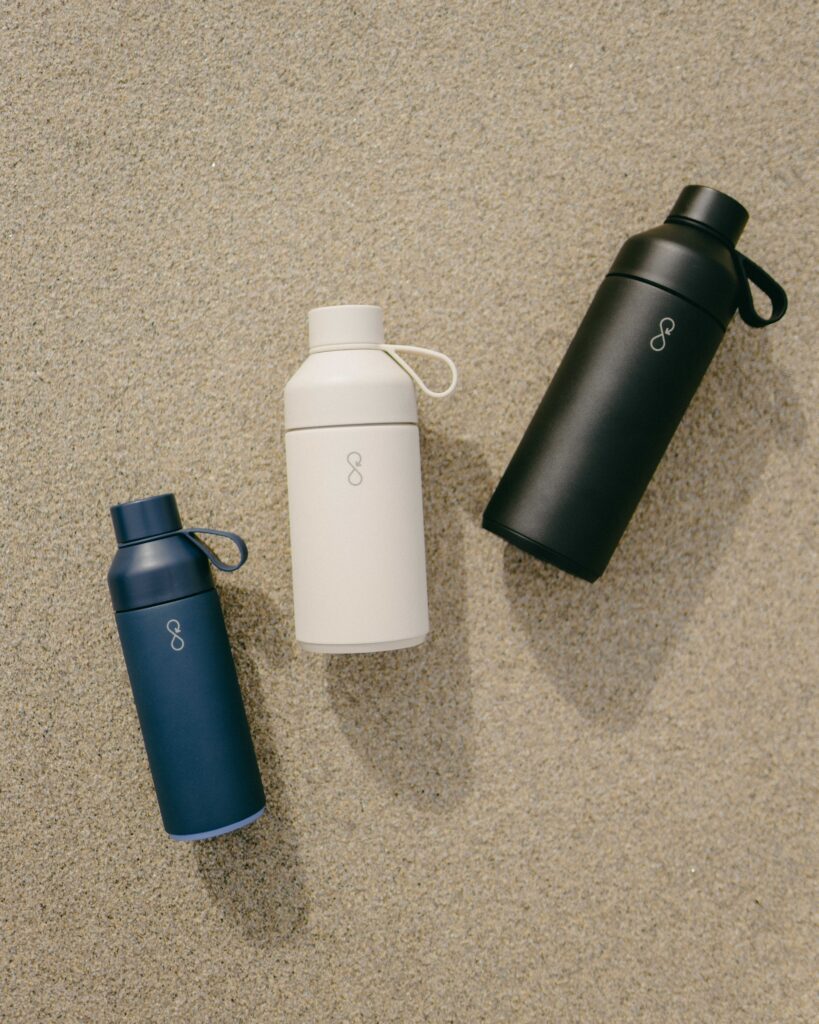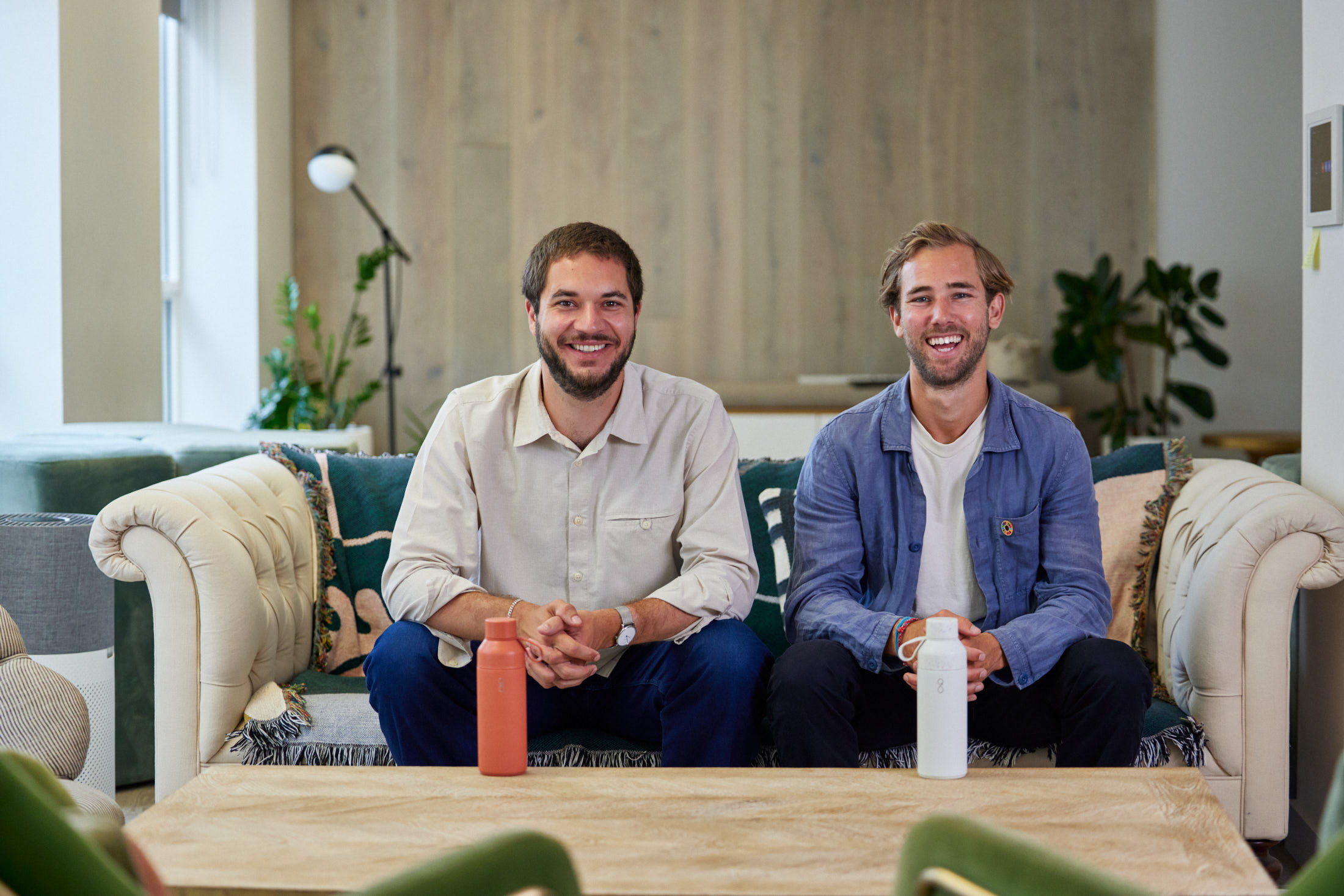1. What was the lightbulb moment that sparked the idea for Ocean Bottle while you were at London Business School?
Will: Before Ocean Bottle, I spent a year working at sea as a deckhand, and what I saw out there stayed with me. One moment that really hit home was in the Maldives. We were sailing through these pristine turquoise waters, and yet our boat alone brought on board over 1,000 single-use plastic water bottles just for the guests. After they were used, they were shipped to an island called Thilafushi, essentially a burning mound of waste. I remember watching it smouldering on the horizon and thinking: this can’t be the solution. That experience gave me a first-hand view of the disconnect between the beauty of the ocean and the scale of the damage we’re causing.
I met Nick on the very first day of our Masters in Management at London Business School, we sat next to each other in our first lecture and immediately bonded over a shared passion for the environment.
Nick: We quickly realised we had a common goal. Will had seen the problem up close and wanted to take action, and I had been exploring ways to build a business where purpose wasn’t just an add-on, but the foundation.
From there, the idea for Ocean Bottle came together, something that could combat ocean-bound plastic at the source, drive behaviour change, and create a business model with impact at its core. London Business School gave us the time, space, and network to bring that vision to life.
2. How did you go from concept to launch, especially with limited resources and a mission that requires scaling impact from day one?
Will: Nick and I were 23 when we started Ocean Bottle and aside from a couple of internships, we didn’t have much work experience between us. The hardest thing without a doubt, was that when you’re starting out you have no resources, so we had to do everything ourselves – from design decisions and manufacturing, to finance, marketing, customer service, operations and sending out stock from the warehouse – we did it all! We were lucky to have some great partners who helped us take on a few areas of expertise, like working with incredible plastic collection partners to realise our impact and a Norwegian product design agency called K8.
Nick: We also built in impact from day one, every bottle funds the collection of 1,000 ocean-bound plastic bottles. That made our early supporters feel like stakeholders in a shared mission, which was essential in our early momentum.
3. Ocean Bottle has stopped over 2 billion plastic bottles from entering the ocean. What key strategies helped you achieve that scale?
Nick: A big part of it was designing a business model where impact is baked into every sale. We also grew through strategic partnerships, working with businesses that wanted high-quality sustainable products that could also drive measurable impact.
We focused on transparency. People know exactly how their purchase contributes to plastic collection, and that builds long-term trust and loyalty. That helped us scale not just sales, but our mission too.

4. How have you balanced purpose and profit while maintaining your B Corp certification and sustainable values?
Nick: Right from the beginning, we wanted Ocean Bottle to be a business that could scale environmental impact, not just generate revenue. Our B Corp certification holds us to these standards, but more importantly, we’ve embedded sustainability into the business model itself: every bottle funds the collection of 1,000 ocean-bound plastic bottles, and to date we have given 15% of our revenue to impact. That means growth directly equals impact.
Will: What’s funny though is thinking back to the start… We actually had an early mentor who said to us that we should cut our commitment and do 100 bottles per product, because we’d never be able to make it work. Which would have meant 1.5% for the planet. What did Nick and I do? Well like any naive early stage founders – we ignored them, ultimately because we recognised that the health of the ocean is worth more than 1%.
5. What were the biggest challenges in securing partnerships with global brands like Google, Disney, and IKEA?
Nick: I think our eighth customer was Ed Sheeran. He ordered a batch for his European tour. And we were blown away. We were like, how on earth have we done this? I’d spent the early days calling every single music production company, film production company, trying to get our bottles in the right places. And then I get a call from Ed Sheeran’s management, and we’re like, this is going to happen every day…every week even. And it definitely wasn’t that easy.
Will: Those early wins were definitely exciting, but they didn’t mean the floodgates opened. The challenge was proving that we could deliver both a premium product and measurable impact at scale. Big brands are rightly cautious, they want to partner with businesses that can meet their procurement standards, ESG goals, and brand values all at once. It took persistence and a lot of learning. But what helped was that our mission was baked into the product, so the value proposition was clear.
Now, we’re proud to have worked with over 2,000 brands around the world. From The North Face, to Paramount, to IKEA, and so many more, we’ve been able to turn what started as an ambitious idea into something companies want to be part of.
6. How did your time at business school shape your thinking around entrepreneurship and social impact?
Will: LBS gave us space to test ideas, learn fast, and connect with others who wanted to build something meaningful. It also helped us understand how to fundraise and build a financially sound business, because without that, your impact can’t scale.
Nick: It also gave us the belief that you can build a values-led business that competes commercially. The mentorship, networks, and exposure were invaluable. Beyond this, LBS’ student-led initiatives like Launchpad help you incubate your idea all the way from concept to a clear business plan and the network that a business school like LBS provides helps provide the early backing to get a venture off the ground.
7. What advice would you give other founders looking to build mission-led businesses that genuinely drive change?
Will: If you haven’t started yet, I’d say pick a problem. Choose a massive global challenge and figure out a way of making a dent on this issue. If you stay true to your mission, you’ll be amazed at how many people want to help you and be part of it. Who knows, if your company gets big enough – maybe you can solve the whole thing.
8. What lessons have you learned about leadership while scaling a team and brand built on environmental values?
Nick: We recently relaunched our company principles. One of them is ‘Give a sh!t and go all in on the mission’. What we are fighting for is bigger than all of us, we’re part of a global effort to safeguard humanity from self imploding and screwing things up for the next generation.
The thing that makes this work is having a team that is so dedicated to the mission, and engaged in defining our future as a business. That level of buy-in doesn’t happen by accident, it comes from creating space for people to lead with purpose. I’ve learned that leadership isn’t about having all the answers, it’s about building trust, listening deeply, and empowering people to challenge the status quo. For us, staying values-led while growing has meant being transparent, admitting when we get it wrong, and continuously inviting the team to shape what comes next.
9. How do you maintain authenticity and trust with your community as you grow into a global player?
Nick: It’s all about transparency. In an era where consumers are more discerning and vigilant than ever before, transparency has become the bedrock of trust. At Ocean Bottle, we have embraced transparency not just as a policy, but as a fundamental principle that guides our decisions.
Will: We have come a long way in terms of our mission and our impact, but we are still far from perfect, and we make sure we’re honest about that. Whether that is the fact that we put products into the world that have a footprint, that we are yet to reach 100% recycled content across our range or that we manufacture the majority of our products in China. We try to surface all of the challenges in the belief that by being open about our practices, challenges, and our impact, we not only build trust but also inspire others to join us on the long and hard road to true sustainability.
10. What’s next for Ocean Bottle. How do you plan to expand your impact and reach in the coming years?
Will: I love this question. It’s definitely what gets me out of bed every morning.
The next chapter is about scaling our impact and doing what we do even better, reinvigorating our brand whilst staying true to our DNA, and bringing out more innovative ways for people to make a global impact on ocean plastic.Nick: I’ve just made the move over to the US, I’m now based in New York City to spearhead our growth in the market. We’ve recently launched in US retailers REI and Nordstrom in stores across the States, so it’s a super exciting time for Ocean Bottle. We’re all set for global expansion, more growth, and in turn, making an even bigger impact. I can’t wait.

